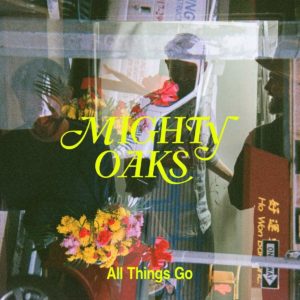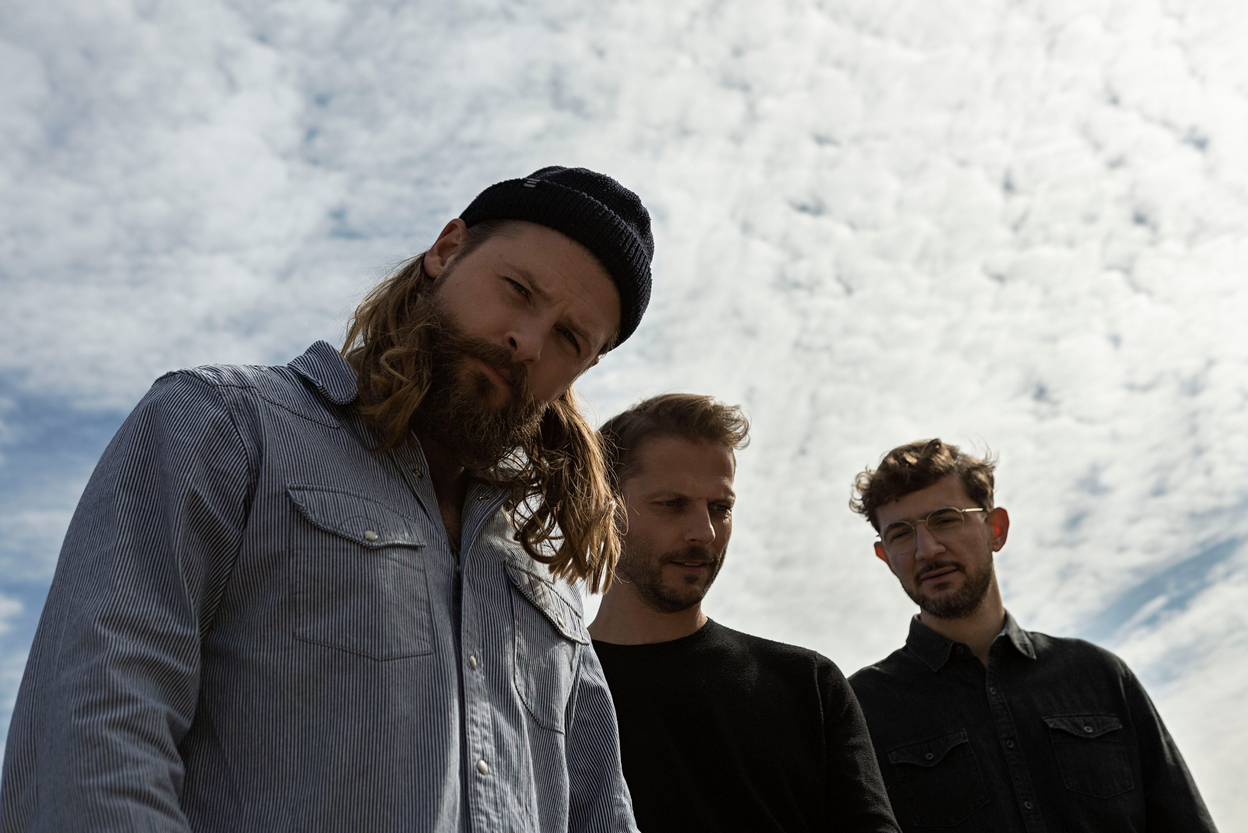Foto-© Bella Lieberber
Wer sich heute noch als besonderer Act im Bereich “handgemachte Folk-Musik” einen Namen machen will, der muss wirklich schon einiges zu bieten haben. Das multinationale Berliner Trio Mighty Oaks stellt dieser Herausforderung seit nunmehr zehn Jahren Bandgeschichte liebevoll arrangierte Vokalharmonien und einen Gitarren-getriebenen Sound entgegen, in dem Erlebtes und Reflektiertes gleichsam vertont wird. Die poppig-folkigen Balladen entspringen oft romantisch aufgeladenen Naturszenerien und nicht selten schallt die Musik der Herren um Frontmann Ian Hooper wie ein einsamer Ruf in die ungebändigte Wildnis und transportiert glückselige Unbeschwertheit – ohne dabei nostalgische und melancholische Zwischentöne vermissen zu lassen.
Auf dem neuen Album sollte vieles anders werden – und eben auch der Anspruch an einen authentischen Folk-Sound wurde hinterfragt. Doch das Trio hat es mit seinem dritten Album All Things Go geschafft, ein abwechslungsreiches und vor allem von persönlichen Themen geprägtes Werk geschaffen, das nach wie vor die eigene Handschrift trägt. Das folkige Gerüst ist geblieben, an einigen Stellen ist es noch poppiger geworden, klingt dabei aber vor allem nach neuen Erlebnissen und viel persönlicher Reflexion. Im Rahmen ihrer Deutschlandtour haben wir die drei dazu befragt, was den neuen Sound der Band ausmacht, über die Themen der neuen Platte gesprochen…und herausgefunden, wo Ian Hooper am liebsten Inspiration für neue Texte sammelt.

First of all: Congratulations on the release of your new album! How does it feel to let your new songs go public after all the hard work?
Ian: Thank you! Very good, it’s always nice to have new music. It feels exciting. But then it feels like today’s era of releasing music goes away pretty quickly. But the excitement, the build-up is always pretty fun.
How did these first live shows with your new songs feel like?
Ian: Well, the fans have been singing along to the new songs already, so it’s good for us, it’s a good sign. The new songs are really fun to play.
Are there specific songs that are fun to play live in particular? Do you have any favourites so far?
Craig: We don’t know yet, it changes a bit. With some songs at the beginning, they were really fun to play and there are some other ones that grow and become more fun to play over the course of time. I Need You Now for instance is a song we really liked the energy of, but Crazy is another one, which we weren’t really expecting to have such an energy live…
Prior to the release, you stated that you previously limited yourself in sticking to the label of „hand-made folk“. How did you manage to free yourself from that? What’s different on this record?
Ian: Our producer was definitely a big hand in helping to kind of free ourselves, if you like. It was just the way that he worked, he made it a lot of fun. There weren’t really any limits or barriers where we would often maybe trying to get perfect takes of things. He was often like: „Hey, if this works, it doesn’t matter what it is, we don’t need to re-record some things, we can keep some things in there, we’re trying new sounds. It was a little bit more open to just trying some things out, taking us a little bit out of our comfort zones and maybe places where we wouldn’t push ourselves. It was also important to find out where the line is, in „okay, that’s too far from our sound“. It was kind of a lot of fun.
And the record is still folky, if you think about songs like All Things Go, Lost Again or Kids.
Claudio: Well, of course. It’s hard to be objective when you’re so closely related to it, but we definitely feel that for us it’s trying new sounds or new soundscapes within the music that people know us for and taking it a little bit further, pushing its boundaries.

„If you only do what you’ve always done / You’ll only get what you’ve always got“ you sing in the song What You Got. How does that describe the liberation process for you?
Claudio: It mirrors a little bit what we do. It was the curiosity and the desire to start something new. But it’s not entirely new to us, actually. The first two albums are also different in a way. And the fourth one is going to be different too. It’s a natural process for us. There are three years between the albums, a lot changes in terms of what we listen to, to what we’re attracted to and the tools that we have around us. After the experience of playing a lot of shows live we were drawn into the curiosity of using more electric guitars and electrical instruments and do things a bit more live, so go into the studio, and put the mics on record. Then after the acoustic tour, in that case it was an analogy between what we’ve been doing and what we were recording. And then after the acoustic tour, which was completely stripped down, we bounced back into a complete opposite, working in a room with only a few, but really good tools, making heavy use of technology, laptops. So, it’s always a nice journey, which keeps it interesting for us to change up things.
How was the working process on this album this?
Ian: We felt that it felt quite natural with this album, we just had to find the right people to do it with. But once we got that lined up, it came naturally quickly after we started working in the right constellation. That was a good sign. We were obviously searching a little bit, weren’t quite sure what we were searching for until we found it. It was also a question of the one who was producing the album and also how that individual would unlock our individual creativity as well.
Were there any key moments where you knew: This is exactly what we need to figure out this album?
Ian: It evolved pretty naturally, actually. When we ended up working with Nikolai [Potthoff] in the end, he is just very talented in what he does. He is moving pretty fast, not getting stuck up on little things that could halter the production. And so, it was just quite the thing we needed to get it done.
I have the impression that All Things Go is your most personal, intimate work to date. Especially the notion that nothing in life lasts forever in connection to personal stories struck me as a recurring theme. How do you feel about that – what does the album represent for you?
Ian: All of our songs and all of our albums are pretty personal. Somewhat autobiographical, somewhat more broad-reaching in their topics. We talk about very honest, everyday themes and we don’t feel that this album sticks out in that sense much more that any of the other ones. The topics have stayed similar throughout the albums, we just give them different means of production.
Your songs are often set in the midst of romantic landscapes, telling tales of friendship, love, loss and the surprising beauty of life. I am thinking, for example, of Brother, The Great Unknown or the most recent All Things Go. What kind of connection do you see there?
Ian: Maybe it’s nothing too specific to be found there. We all really like open nature, so those themes come up naturally, that’s where we feel most comfortable. The other topics of family, friendship and fun, but also melancholy and everything, depends on where you’re sitting on and what mood you’re in. Everyday brings new challenges or hopes and that affects the way that songs are written. But nature is definitely an inspiration in songwriting, although it is also hard to stick to nature topics. It’s easier to sing ten love songs than sing ten songs about a tree. It’s easier to relate that way.

Is there an atmosphere that you would relate to your songs?
Ian: Our songs are on a spectrum between melancholy and happiness, and everything in between. We have songs that are very „nachdenklich“, that are very contemplative. Than we also have ones that people can identify with when they have happy moments in their lives. Our music is just for the everyday person. It’s more for your everyday life than like the art school student, the ones who are very critical and everything, and trying to be edgy. Our stuff is more for the honest and everyday person.
When you think of your record, which feeling is weighing the most? Is it more the bliss of being happy, or moments of melancholy?
Craig: It’s really both, it’s got everything in there, it’s like life itself. It’s got ups and downs. There are some happier moments, some more introspective, quieter moments. But even the sad songs, they still to have a positive vibe. There are sad ones like Aileen and there are positive sad ones like All Things Go.
Let’s move on to your creative process. Is there something that helps you get started? Are there any specific places or environments where you write best?
Ian: One thing we really value when we’re trying to be creative is just having time and having quiet and having space. Of course, those things are really hard to find when you have a family, or when you live in the city. We took some writing retreats together to places outside of Berlin, for instance. Well, to just being able to feel good in your surroundings, that unlocks a bit of creativity and peace of mind for me. Obviously, alone on top of a mountain would be the best scenario, but that’s really rare to achieve.
Let’s talk about composition process: What kind of division of work do you follow?
Ian: I’m usually writing the lyrics, but we all work together on all the music. The guys are super good at taking a rough idea that I may have and then having a vision of it to see through the end, which I usually don’t.
What kind of music to you guys listen to in your free time?
Ian: That’s a tough one for me, especially when I’m writing, I don’t listen to other music. I was just talking about this yesterday, that I need to listen to more music again, just to reconnect. I’ve had a little bit of a „dry spell“ lately. Foxwarren, I like them a lot right now.
But doesn’t it also inspire you for your own work, the input of listening to other bands?
Ian: Sure, but also the music that is coming out right now, it’s not too inspiring.
Do you listen folk music at all?
Ian: No, not right now. I was listening to the new Lumineers stuff for a while, because we were on the road with them. I guess I listen more to the classic singer-songwriters. I love Tom Petty, Bob Dylan sometimes, Bruce Springsteen. But generally, I listen to anything, indie rock, because it’s not something I’m interested in writing really. I can just listen to it and enjoy it. Hip-Hop, because I like the grind of it. I’m not going to be doing any hip-hop. I try not to listen to stuff that will try to make me change my music completely.
Claudio: I’m having a phase that I’m listening to lot of electronic stuff, like Caribou, Four Tet, Bibio, Tycho. These guys that make everything with their laptops basically. Sometimes it’s kind of video game music, a little bit too much for me, but they have also some good stuff. Bibio is also a guitar player, it’s really nice.
Craig: Podcasts, to help me fall asleep. A lot of times I’m not really paying attention to what it is, like the stuff that is on my running playlist. Also, I have two smallish children and I’m drawn into what they are listening to. I always assume when we go on tour that I will have more time and be like: „I am going to sit down and to listen to all these albums that I have saved and I didn’t get around to“, but then it’s like the last thing you want to do. It also puts me off a little bit, because then I keep analysing while listening. It’s weird.
Ian: It’s like when you’re a painter and you go to an art exhibition where you’re just looking at all the brushstrokes. And when you’re a musician you just listen to songs and you just skip around and you’re like: „Where’s the chorus, where’s the pre-chorus, where’s the bridge, where are the transitions and what effects are they using?“ It’s too much compression.
Craig: It’s hard to switch that part off. So then sometimes listening isn’t that enjoyable as you want it to be. Oh wait: Tool, they recently released their whole back catalogue on Spotify, so that’s making me happy.
Can you imagine Mighty Oaks releasing something that is totally different from anything you guys have ever done so far?
Ian:Definitely, yeah. We would probably be happy to do that. A stoner rock album probably. We’ll just release some EPs next year. Probably like one electronic EP, a grunge EP… who knows? Craig: Sometimes it’s the most fun you can have. It’s a good release to just spend a few hours messing around, doing styles of music that you really probably shouldn’t. Maybe we could even do Reggae covers of our own songs. That’s a bit of a thing in the bus between our crew and us. How well we could transform one of our songs into great covers in that style.
Sounds great, we will stay tuned for that. Thanks for your taking your time!










